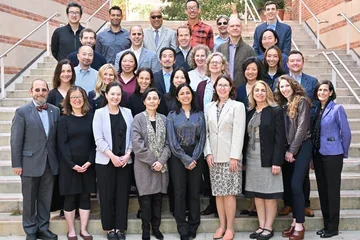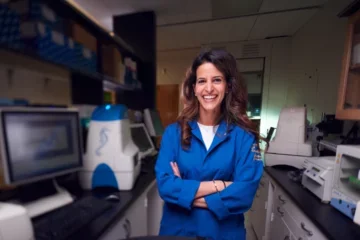A Day in the Life of a Pediatrician at UCLA

Dr. Jessica Lloyd Describes an Average Day for a Pediatric Hospitalist at UCLA
Unlike most future doctors, Jessica Lloyd, MD didn't spend much time in medical school wondering what field to go into. She'd wanted to be a pediatrician since childhood.
"I liked my pediatrician and saw her as a role model," says Dr. Lloyd. "Growing up, I was a camp counselor and loved working with kids. There's nothing else I could see myself doing."
Now a pediatric hospitalist at UCLA and assistant clinical professor at the David Geffen School of Medicine at UCLA, Dr. Lloyd talks about a day in the life of a pediatrician and offers advice to medical students considering the same career path.
Lots of Hats
As a doctor and educator, the day-to-day varies tremendously for Dr. Lloyd.
When she's on the pediatric hospitalist service, she arrives around 7 am and does family-centered bedside teaching rounds with the pediatric resident team between 8 and 10 am. "We see general and surgical pediatric patients," she explains. "I spend the rest of the day examining patients and meeting with families to discuss prognoses and treatment plans. Sometimes I supervise while residents do procedures like lumbar punctures. In the afternoon, I try to do resident-teaching."
Night shift begins at 4 pm. and Dr. Lloyd occasionally works that shift as well. "For the general pediatric team, night shift involves seeing children in the ER and on the floor. We also do resident teaching, usually a 15- to 30-minute interactive case discussion, ideally focused on a patient admitted overnight with an urgent situation, such as hypertension or seizures," she says.
UCLA pediatric hospitalists also work shifts as consulting attendings. "We assist the emergency room with pediatrics consultations, questions or admissions. We also do consults at the neuropsychiatric hospital."
Along with clinical responsibilities, Dr. Lloyd is an associate program director for the pediatric residency program. "I'm very involved in recruitment for next year's intern class and I'm an advisor to many residents interested in hospitalist or fellowship career paths. I meet with advisees, do curriculum development and teach the pediatric resident Quality Improvement electives."
(A Quick Look at Pediatric Subspecialities. Click the link to learn more...)
Highs and Lows
Dr. Lloyd's favorite part of the job is morning bedside rounds. "I get to see patients, bond with them and their families and hopefully help them heal," she says. "And I enjoy hearing the residents' thought processes behind patient assessments — what made them decide this child with seizures needed this workup versus that workup. It helps me understand their level of pediatric knowledge so I can build on that as I teach them."
But being a pediatrician isn't always fun. Pediatricians face unique challenges, the most difficult of which are seeing children suffer and losing patients. "Seeing families go through so much pain is devastating and I still struggle to make sense of things. You can't explain why illness happens to children. It's unfair, but I have to process that and still have a good attitude at work."
(Is Being a Pediatrician Hard? Click the link to learn more...)
Makings of a Pediatrician
Dr. Lloyd says that to get through a day in the life of a pediatrician, you must enjoy working with children and families, have the clinical skills necessary to diagnose patients who can't communicate well and build up resilience to sadness. "Resilience is somewhat innate and can also be learned. Here at UCLA, we strive to teach our residents resilience skills. Interns straight out of medical school may not have these skills, and that is normal," she explains. "There's not much sadder in this world than a sick or dying child, and that turns many people off from pediatrics. But pediatrics is also a fun and exciting field, and just the most rewarding job."
Her best advice for medical students considering pediatrics is such: "There are so many pediatric specialties and different places to use those skills, so try to shadow as many people as possible to see what we do and find your niche."
(Interesting in Becoming a Pediatrician? Click the link to learn more...)



